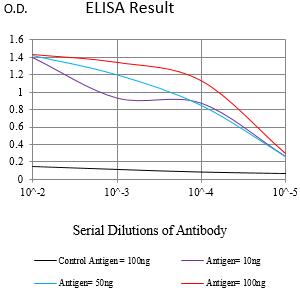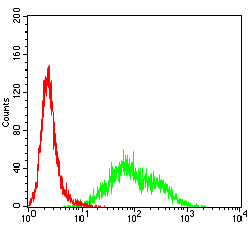


| WB | 1/500 - 1/2000 | Human,Mouse,Rat |
| IF | 咨询技术 | Human,Mouse,Rat |
| IHC | 咨询技术 | Human,Mouse,Rat |
| ICC | 技术咨询 | Human,Mouse,Rat |
| FCM | 1/200 - 1/400 | Human,Mouse,Rat |
| Elisa | 1/10000 | Human,Mouse,Rat |
| Aliases | BST1 |
| Entrez GeneID | 683 |
| clone | 1A9E7 |
| WB Predicted band size | 35.7kDa |
| Host/Isotype | Mouse IgG2b |
| Antibody Type | Primary antibody |
| Storage | Store at 4°C short term. Aliquot and store at -20°C long term. Avoid freeze/thaw cycles. |
| Species Reactivity | Human, Rat |
| Immunogen | Purified recombinant fragment of human CD157 (AA: 82-293) expressed in E. Coli. |
| Formulation | Purified antibody in PBS with 0.05% sodium azide |
+ +
以下是关于CD157抗体的3篇代表性文献的简要总结:
---
1. **文献名称**: *CD157 Confers Host Resistance to Mycobacterium tuberculosis via TLR2-CD157-PKCζ Signaling*
**作者**: E. Ishihara et al.
**摘要**: 研究揭示了CD157通过TLR2信号通路激活PKCζ,增强巨噬细胞对结核分枝杆菌的吞噬和清除能力,提示CD157抗体可能用于调控宿主免疫反应。
---
2. **文献名称**: *Targeting CD157 in Epithelial Ovarian Cancer Using a Novel Humanized Antibody*
**作者**: T. Hiroyama et al.
**摘要**: 该研究开发了一种人源化抗CD157单克隆抗体,证明其在体外和小鼠模型中可抑制卵巢癌细胞迁移和侵袭,为CD157作为治疗靶点提供实验依据。
---
3. **文献名称**: *CD157 as a Biomarker for Inflammatory Bowel Disease: Role in Neutrophil Migration*
**作者**: Y. Ortolan et al.
**摘要**: 研究发现CD157在炎症性肠病患者肠道中性粒细胞中高表达,抗体阻断CD157可减少中性粒细胞迁移,提示其作为治疗肠道炎症的潜在靶点。
---
以上文献涵盖了CD157抗体在免疫防御、癌症治疗及炎症疾病中的不同作用机制。如需具体文献链接或补充,可进一步说明。
CD157. also known as BST-1 (bone marrow stromal cell antigen-1), is a glycosylphosphatidylinositol (GPI)-anchored cell surface protein belonging to the ADP-ribosyl cyclase family, which includes CD38. Initially identified in bone marrow stromal cells, CD157 plays roles in immune regulation, cell adhesion, and signaling. It functions both as an ectoenzyme, catalyzing NAD metabolism, and as a receptor involved in leukocyte migration and inflammation. CD157 is expressed on myeloid cells, endothelial cells, and certain cancer cells, and its dysregulation has been linked to autoimmune diseases (e.g., rheumatoid arthritis) and malignancies (e.g., leukemia, ovarian cancer).
CD157 antibodies are critical tools for studying its biological functions and clinical relevance. They enable detection of CD157 expression in tissues or cell lines, aiding in disease diagnosis and prognosis. In research, anti-CD157 antibodies help elucidate mechanisms of leukocyte trafficking, stromal cell interactions, and NAD-mediated signaling. Therapeutically, CD157-targeting antibodies are explored for immune modulation, particularly in cancers where CD157 overexpression correlates with metastasis or chemoresistance. Challenges remain in understanding its dual enzymatic/receptor roles and tissue-specific effects. Recent studies also highlight CD157’s potential as a biomarker for minimal residual disease monitoring in hematologic malignancies. However, its interplay with CD38 and broader NAD metabolome warrants further investigation to optimize antibody-based applications.
×